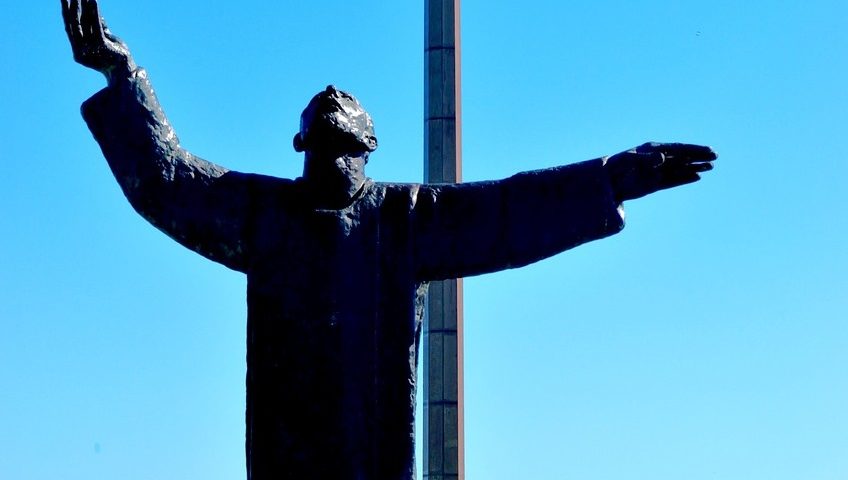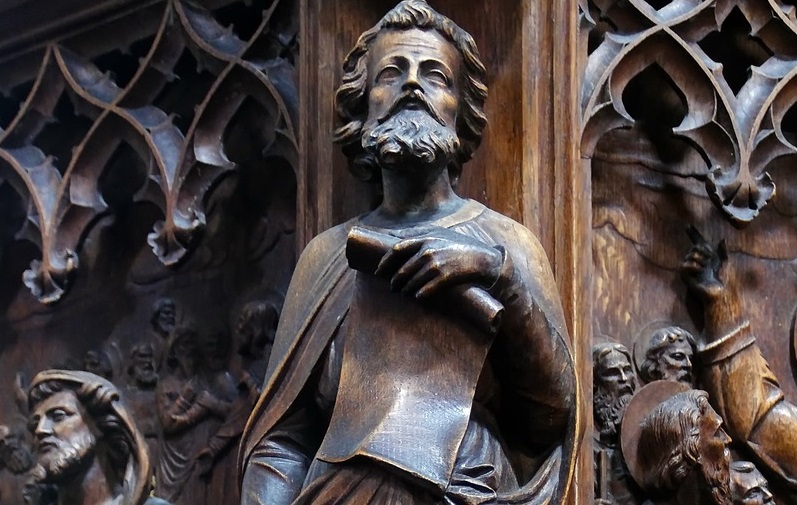An ancient superstition: in some corners of the Christian world, it was considered a bad omen to meet a priest.
There’s one story—strangely relevant to me, still so closely removed from Covid as we are—of a poor priest in France; it was during a pandemic, and the people of his village just didn’t want to have anything to do with him—they didn’t want the bad luck that would come from seeing a priest, especially with all sorts of disease going around—so they decided that the only sensible thing to do was to throw their priest into the open grave on the edge of town, among all the deceased the priest’s bad luck had already done in. That’s one way to avoid seeing a priest, but a bit extreme in my opinion.[1] Now, of course, that’s just an old folk tale, an old legend, a yarn—or, at least, I hope so. In any case, I’m grateful not too many of you are superstitious, grateful you handled our recent pandemic with a bit more decorum.
However, I do think a bit of that ancient superstition remains. Some people still do not like to meet a priest. If not exactly superstition, it remains for some, I think, awkward, discomforting, to meet a priest; sometimes people can’t help but be rude or just weird around clergy. It’s strange sometimes being a priest in public. I remember once—it was the only time I’ve ever been to Las Vegas; I’ve only ever been to the airport—I sat down next to two young men all dressed in black (just like me; I thought we’d get along), but actually they were Satanists, I quickly found out, who had been attending a Satanist convention (turns out there are such things). What I thought would be a warm welcome, of course, wasn’t. You should’ve seen the look on their faces when I turned to them and smiled; without a word they got up from their seats and walked to the other side of the terminal. I didn’t even get to ask their names. Now, I don’t know if that was superstition, but they sure didn’t want to talk to me. But in any case, again, I’m grateful that it was just an awkward encounter and not a medieval one; grateful that that’s about as bad as it gets these days—silly Satanists in an airport, being stared at in a Starbucks, somebody’s rude Catholic-hating brother-in-law at a wedding. I can handle that; that’s not a big deal at all.
Now, I am not playing the victim here. Don’t feel sorry for me or any priest. Rather, the reason I bring this up (this ancient and contemporary dislike of priests) is to suggest that there is in fact some good in it, something moral about it (except, probably, for those two silly Satanists in the airport). I’m thinking here of this passage from Malachi. God, through the prophet, with his priests, is having an encounter of his own, and it, too, is awkward and discomforting. The priests on the receiving end of this warning in Malachi may have very well thought it rude, disrespectful even to hear what they heard: “And now, O priests…If you do not listen…I will send a curse upon you…your blessing I will make a curse…I have already cursed it.”[2] This is an awkward encounter; the priests in this passage are as good as bad omens. The point here, very simply, is that clearly there are times when it’s okay to be this rude to priests and other religious leaders. Jesus did it—calling out hypocrites, those who preach the faith but don’t practice it.[3] I’m not playing the victim at all; in fact, I want to let you know it’s a good thing to talk this way to clergy sometimes. Go for it.
But, of course, do it correctly. It’s important we pay attention to what God, through the prophet, was criticizing; important too, what Jesus was saying. Because it wasn’t superstition—but truth—that was the issue. What was wrong with these priests—and also what was wrong with the scribes and Pharisees in Matthew—wasn’t that they failed to meet the expectations and demands of the people but that they failed to meet the expectations and demands of God. In Malachi the problem was that the priests didn’t apply the truth of God’s law fully or equally; rather, they showed “partiality” in their decisions.[4] That is, sometimes for some things they would bear down with the full and awesome truth of God while at other times, not so much; they were selective, maybe, about when to play the religion card. That’s what God was mad at priests about. In Matthew, Jesus tells the people to observe what the scribes and Pharisees teach; “but do not follow their example,” he says.[5] Again, the problem seems to be not that these spiritual authorities were religious but that they weren’t religious enough. They were only religious enough to be hypocrites and sellouts. They didn’t offer the people what Paul called the “whole counsel of God.”[6] That was the problem—why God talked about curses and Christ said “Woe to you”—not because they failed the people but first because they failed God.[7]
But, of course, that’s not what most complaints about clergy are about. Mostly it’s about unanswered email (I’m bad at that) or about how we can’t do this wedding on that date or have confessions when I want to have confessions. Now, certainly, those are not illegitimate complaints; I get it, sometimes things don’t go right, and sometimes it’s totally on us. The point I’m making, though, is that these prophetic complaints—like what we see in Malachi and Matthew—are much rarer. People get more mad when I fail to serve them than when I fail to serve God; that’s the strange thing. That’s what I’m trying to diagnose, this measuring of the priesthood as only a customer service. Why does that happen?
I think partly it’s because if our clergy were as holy as God expected them to be, then the people would have no excuse for not knowing how holy God wanted them to be. And some of us don’t want to be as holy as God wants us to be. Because that’s frightening; because that may very well make martyrs of us all; just enough religion to make us respectable, thank you very much—not holy. I want the priest to put on a good wedding not drone on about the sanctity of marriage; preach repentance, fine, if you want, but don’t get too specific; don’t force me to accept that you’re talking about me; always make me think you’re preaching about someone else, even better if it’s someone I don’t like.
If you study closely this passage from Malachi, you’ll notice that at the beginning God is talking about the abomination of the blemished sacrifice, the abomination of it when people do not offer God their very best, when they give God not their best animal for sacrifice but only the one they’re not bothered to part with—you know, after taxes; it’s about the cursedness of not giving God your very best. At the end of passage, the discussion turns to marriage, about how it’s too often and too widely defiled—“the Lord is witness between you and the wife of your youth,” the prophet says—it’s the beginning of a passage about monogamy.[8] For some reason, however, this passage was curated just perfectly, so you wouldn’t readily recognize it; but God seems to be as upset with the people here as with the priests. Both are called to be holy, you see—priests and people. And both have failed to live up to it.
You see why it’s easier to complain about the lesser foibles of the priest and not about his lack of holiness? Because if the priest is holy, then you have to be holy. And again, that’s scary to think about, because it may mean you have to change, not just me. I mean, what if I preached on some of these things we find in Malachi today? What if I preached the “whole counsel” of the Gospel? What if I took the governor off the engine? We might have a fight on our hands. You might not like me anymore. And maybe that’s the thing, the problem with the Church today—that we have things just as we like them—tame, inert, mediocre, petty. And maybe that’s what we should pray for—to be liberated from all that, and for the courage to challenge each other to be holy; for I doubt any of us will get to heaven without at least trying. And so, let’s do that; priests and people, let’s challenge each other to be holy. For that’s what real love actually is. That’s what the Church is actually meant to do. Amen.
[1] Jacques de Vitry, The Exempla 268
[2] Malachi 2:1-2
[3] Matthew 23:3
[4] Malachi 2:9
[5] Matthew 23:3
[6] Acts 20:27
[7] Matthew 23:13-36
[8] Malachi 2:14
© 2023 Rev. Joshua J. Whitfield










